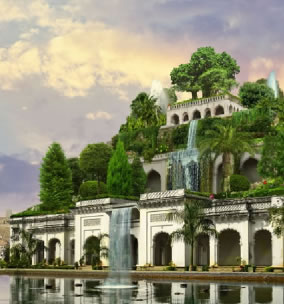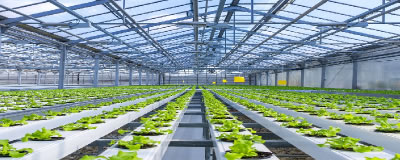Hydroponics - a method of growing plants in water with added nutrients, using suitable substratum instead of soil

It is an old, time-proven science
The practice of growing plants in water, substituting soil with substratum, is known to humankind for a few thousand years.
The oldest hydroponic system - the Hanging Gardens of Babylon - was built in the ancient city of Babylon, on the bank of the river Euphrates. They are considered one of the Seven Wonders of the World (non-extant). It is believed that this magnificent instalation was created 600 BC . According to an old Greek legend, the gardens were built to cheer up Nebuchadnezzar's homesick wife, Amyitis. The land she came from was green and mountainous, so she found the flat, sun-baked terrain of Mesopotamia depressing. The king decided to relieve her depression by recreating her a small piece of homeland through the building of an artificial mountain with rooftop gardens. This is a perfect example of recreational use of hydroponics.
Nowadays hydroponics is widely applied to commercial-industrial purposes as well . Scientists showed interest in it since 17th century, but more exhaustive researches were conducted only in the beginning of 20th. Hydroponic methods have found their way into industry in the second half of 20th century (around 1970). The main cause of rapid evolution of hydroponics in EU is the constantly growing demand for environmentally friendly products.

Advantages
- By using a correctly designed hydroponic system and recent growing technologies, maximum yield of good quality plants can be achieved;
- A period of growth and maturation is much shorter without a negative impact on quality;
- Using an automated hydroponic system makes possible to grow plants of precisely predictable quality. Not only for your table, but for specific needs of medical, toiletry, military and other demanding industries;
- It is possible to grow plants in places with no fertile soil, scarce water supplies: rooms in city buildings, submarines, spacecraft;
- Low demand for workforce, - no need for laborious soil cultivation;
- In case of a closed system, plants are at a lower risk of developing diseases associated with infected soil or environment.
Disadvantages
- Significant startup investments are needed;
- Specific knowledges on plant biology, fertilizers, control and maintenance of a growing equipment are necessary;
- There is a possibility of rapid spread of infection via water. Closed systems ang great care should be used;
- High demand for electric power.

Why hydroponics ?
For thousands of years plants keep adapting to changing environmental circumstances, their biological processes effectively consume resources given by nature. But what if an environment changes too drastically, if plants are affected by bacteria, animals, climate change? People prayed, made sacrifices to the gods in hope of a fertile season. But is this enough? People want to understand plant's physiological processes, try to minimize impact of nature's whims. For this, a specific, continual observation of a plant is inevitable, - the task imposible for a human without special equipment. Only automated systems allow to effectively oversee and control the growth of a plant, to react timely to variations in its life processes.
Automated hydroponic systems give us a possibility of growing plants independently from external conditions, strictly according to modern scientific recommendations.
We offer
We offer design, installation and maintenance services for hydroponic systems corresponding strictly to your needs. Our specialist can visit you at no-cost and advice on choosing a right system for your premises, consult on aspects of building new special rooms.
We cooperate with specialists from Netherlands and can jointly advice on selecting the best suited plants for your hydroponic system.
